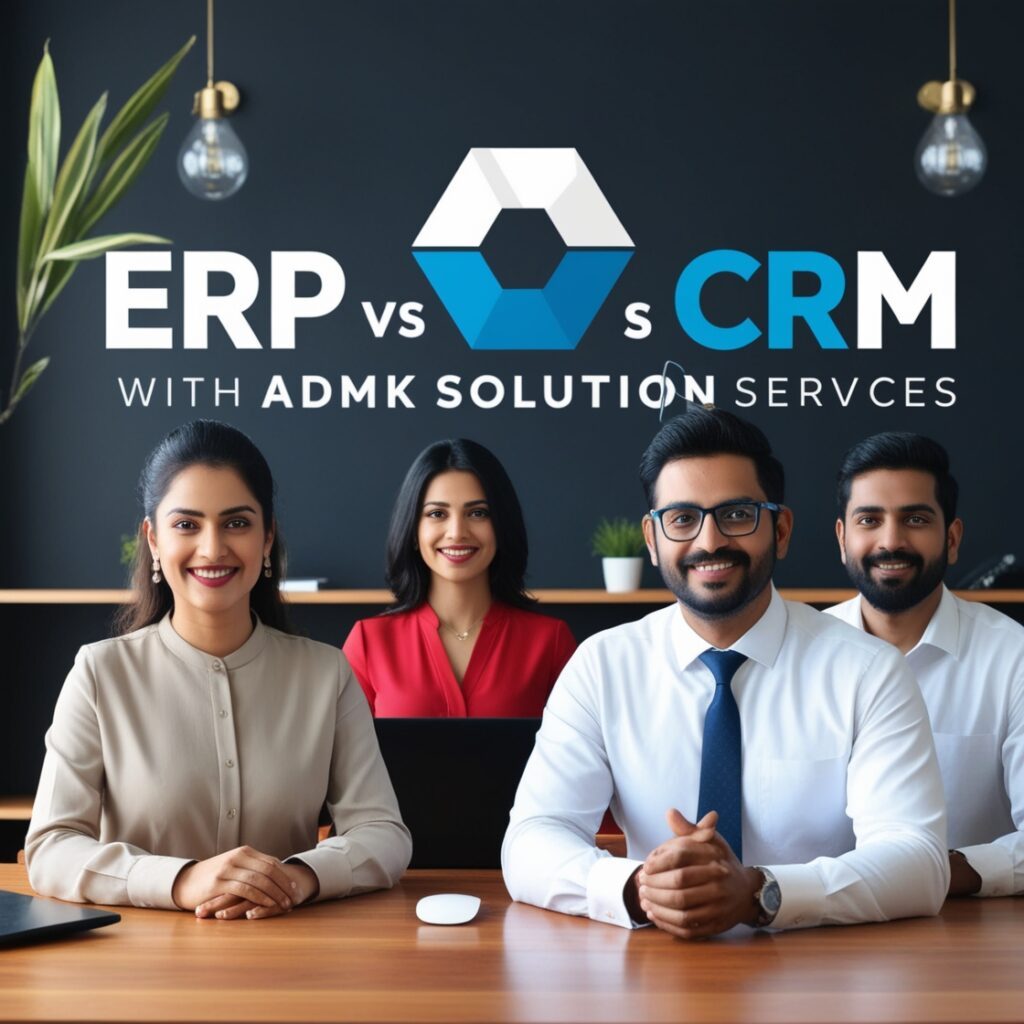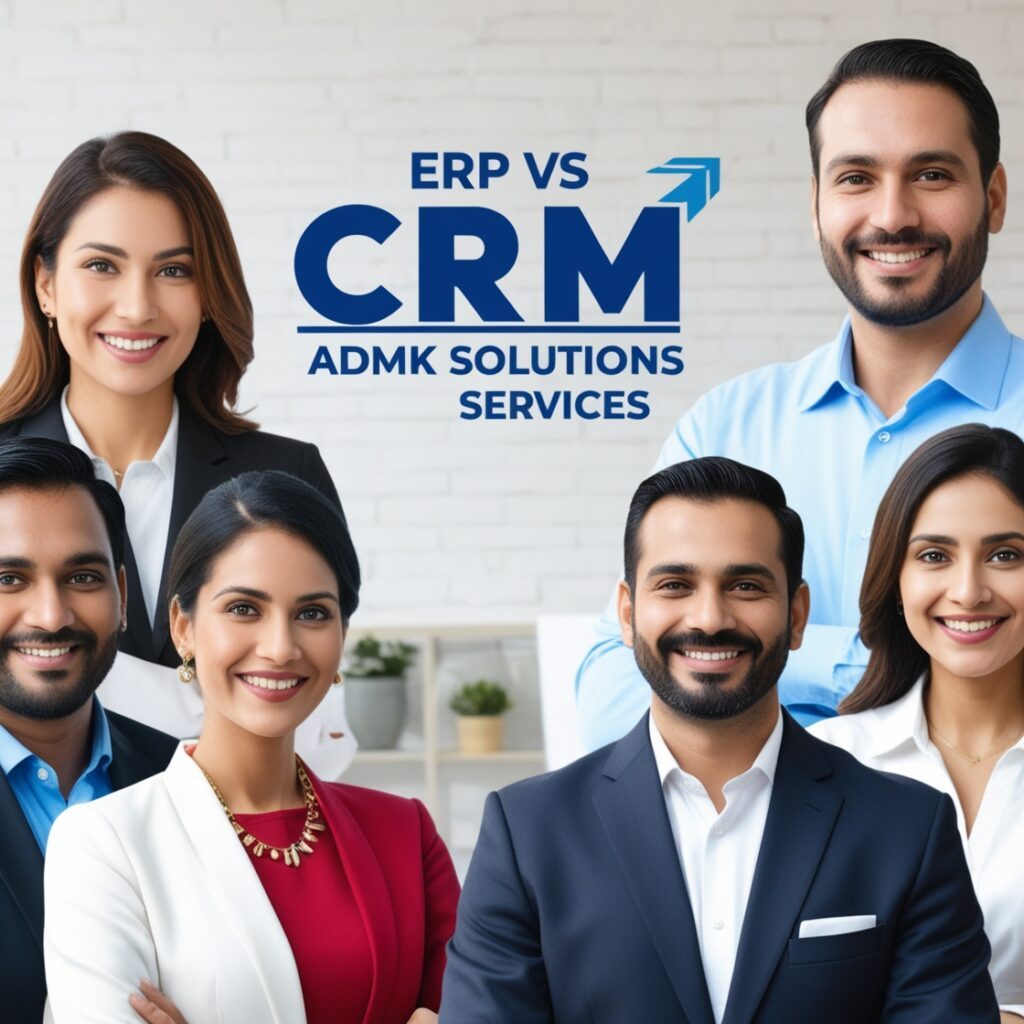In today’s competitive business environment, companies need efficient and effective systems to manage their operations and customer relationships. Two of the most powerful tools for achieving these goals are Enterprise Resource Planning (ERP) and Customer Relationship Management (CRM) systems. Both systems offer unique advantages, and understanding the differences between them can help businesses make informed decisions. At ADMK Solutions, we specialize in providing comprehensive digital solutions, including ERP and CRM systems tailored to your specific needs. In this blog, we will delve into the intricacies of ERP and CRM, their benefits, and how ADMK Solutions can help you implement these systems for optimal business performance.
Understanding ERP: The Backbone of Business Operations
Enterprise Resource Planning (ERP) systems are integrated software solutions that manage and automate core business processes. These processes include finance, human resources, supply chain, manufacturing, and more. An ERP system serves as a central hub for collecting, storing, and interpreting data from various business activities, providing a single source of truth for the entire organization.
Key Features of ERP Systems
Financial Management: ERP systems offer comprehensive financial management capabilities, including accounting, budgeting, financial reporting, and forecasting. This ensures accurate financial data and streamlined financial operations.
Human Resources Management: ERP solutions manage HR functions such as payroll, employee records, recruitment, training, and performance management. This enhances workforce efficiency and productivity.
Supply Chain Management: ERP systems optimize supply chain operations by managing procurement, inventory, order processing, and logistics. This leads to improved supply chain visibility and reduced operational costs.
Manufacturing and Production: ERP solutions support manufacturing processes by managing production planning, scheduling, quality control, and maintenance. This results in higher production efficiency and product quality.
Project Management: ERP systems facilitate project planning, execution, and monitoring. They provide tools for managing resources, timelines, budgets, and project performance.
Benefits of ERP Systems
Improved Efficiency: ERP systems streamline business processes and automate repetitive tasks, leading to increased operational efficiency and reduced manual effort.
Enhanced Data Accuracy: By consolidating data from various departments into a single system, ERP solutions ensure data accuracy and consistency across the organization.
Better Decision-Making: ERP systems provide real-time insights and analytics, enabling informed decision-making based on accurate and up-to-date information.
Scalability: ERP solutions are scalable and can grow with your business. They can accommodate increased data volumes, additional users, and expanding operations.
Regulatory Compliance: ERP systems help businesses comply with industry regulations and standards by providing tools for auditing, reporting, and documentation.
Understanding CRM: Building Strong Customer Relationships

Understanding CRM: Building Strong Customer Relationships
Customer Relationship Management (CRM) systems are designed to manage and enhance interactions with customers and prospects. CRM solutions focus on sales, marketing, customer service, and support, helping businesses attract, retain, and grow their customer base.
Key Features of CRM Systems
Sales Management: CRM systems provide tools for managing sales pipelines, tracking leads, opportunities, and deals. They offer sales forecasting, performance tracking, and automation of sales tasks.
Marketing Automation: CRM solutions enable targeted marketing campaigns, email marketing, social media management, and lead nurturing. They provide insights into campaign performance and customer engagement.
Customer Service and Support: CRM systems manage customer inquiries, support tickets, and service requests. They offer self-service portals, knowledge bases, and case management tools to improve customer satisfaction.
Contact Management: CRM solutions maintain detailed records of customer interactions, contact information, communication history, and preferences. This ensures personalized and consistent customer experiences.
Analytics and Reporting: CRM systems provide analytics and reporting tools to measure customer behavior, sales performance, and marketing effectiveness. They offer dashboards and reports for data-driven decision-making.
Benefits of CRM Systems
Enhanced Customer Relationships: CRM systems enable businesses to build and maintain strong customer relationships by providing a 360-degree view of customer interactions and preferences.
Increased Sales and Revenue: CRM solutions help businesses identify sales opportunities, track sales performance, and improve conversion rates. This leads to increased sales and revenue growth.
Improved Customer Service: CRM systems streamline customer service processes, ensuring timely and effective resolution of customer issues. This enhances customer satisfaction and loyalty.
Targeted Marketing: CRM solutions enable businesses to segment their customer base and deliver personalized marketing messages. This increases the effectiveness of marketing campaigns and improves customer engagement.
Better Collaboration: CRM systems facilitate collaboration among sales, marketing, and customer service teams by providing a unified platform for managing customer interactions and information.
ERP vs. CRM: Key Differences

While both ERP and CRM systems offer valuable benefits, they serve different purposes and focus on different aspects of business operations. Here are the key differences between ERP and CRM:
Purpose: ERP systems focus on managing and optimizing internal business processes, while CRM systems focus on managing and enhancing customer interactions and relationships.
Scope: ERP solutions cover a wide range of business functions, including finance, HR, supply chain, manufacturing, and project management. CRM systems primarily focus on sales, marketing, and customer service.
Data Management: ERP systems consolidate data from various departments into a single platform, providing a holistic view of business operations. CRM systems centralize customer-related data, providing a comprehensive view of customer interactions and preferences.
Implementation: ERP implementations are typically more complex and time-consuming due to the breadth of business processes they cover. CRM implementations are generally quicker and more focused on specific customer-related functions.
User Base: ERP systems are used by various departments within an organization, including finance, HR, operations, and supply chain. CRM systems are primarily used by sales, marketing, and customer service teams.
Integrating ERP and CRM: A Powerful Combination
While ERP and CRM systems serve different purposes, integrating them can provide significant advantages. By combining the strengths of both systems, businesses can achieve a comprehensive view of their operations and customer interactions. Here are some benefits of integrating ERP and CRM:
Unified Data: Integration ensures that data flows seamlessly between ERP and CRM systems, providing a single source of truth for both business operations and customer interactions.
Enhanced Collaboration: Integration fosters collaboration between different departments, ensuring that sales, marketing, customer service, and operations teams have access to the same information.
Improved Customer Experience: With integrated systems, businesses can deliver personalized and consistent customer experiences by leveraging data from both ERP and CRM.
Streamlined Processes: Integration eliminates data silos and reduces manual data entry, streamlining business processes and improving efficiency.
Better Decision-Making: Integrated systems provide comprehensive insights into both business operations and customer behavior, enabling data-driven decision-making.
ADMK Solutions: Your Partner in ERP and CRM Implementation

At ADMK Solutions, we understand the unique challenges and opportunities that businesses face. Our team of experts specializes in providing customized ERP and CRM solutions that align with your business goals and objectives. Here’s how we can help:
ERP Implementation
Needs Assessment: We conduct a thorough assessment of your business processes and requirements to identify the most suitable ERP solution for your organization.
Customization: Our team customizes the ERP system to align with your specific business needs, ensuring seamless integration with your existing processes.
Implementation: We manage the entire implementation process, from planning and configuration to testing and deployment, ensuring a smooth transition.
Training and Support: We provide comprehensive training to your team and ongoing support to ensure successful adoption and optimal use of the ERP system.
CRM Implementation
Needs Assessment: We analyze your sales, marketing, and customer service processes to identify the best CRM solution for your business.
Customization: Our experts customize the CRM system to match your business requirements, ensuring it supports your sales and marketing strategies.
Implementation: We oversee the implementation process, ensuring seamless integration with your existing systems and processes.
Training and Support: We offer training and support to help your team effectively use the CRM system and maximize its benefits.
Contacting ADMK Solutions:
In 2024, deciding between ERP (Enterprise Resource Planning) and CRM (Customer Relationship Management) systems can significantly impact your business operations. ADMK Solutions offers expert guidance on choosing the right system to align with your business goals. ERP systems streamline and integrate core business processes such as finance, HR, and supply chain, enhancing overall efficiency. In contrast, CRM systems focus on managing customer interactions, improving sales, and boosting customer satisfaction.
To get professional advice on ERP vs. CRM, reach out to ADMK Solutions. You can contact them via email at admk@admksolutions.com. This allows you to detail your business requirements and receive a comprehensive comparison and recommendation tailored to your needs. If you prefer a more immediate discussion, call them at 051-2719081. Speaking with an expert directly provides an opportunity to ask specific questions and gain a deeper understanding of how each system can benefit your business.
ADMK Solutions is dedicated to helping businesses make informed decisions about ERP and CRM implementations. Whether you choose to email or call, their knowledgeable team is ready to assist you in evaluating the pros and cons of each system, ensuring you select the one that best suits your operational and strategic goals. Contact ADMK Solutions in 2024 to optimize your business processes with the right technology.
Conclusion
Choosing the right solution for your business requires a clear understanding of your needs and objectives. ERP and CRM systems offer unique advantages, and integrating them can provide a powerful combination for managing both business operations and customer relationships. At ADMK Solutions, we are committed to helping you achieve your business goals with customized ERP and CRM solutions. Whether you need to streamline your operations, enhance customer relationships, or both, our team of experts is here to guide you every step of the way. Contact us today to learn more about how we can help you implement the right solutions for your business.
